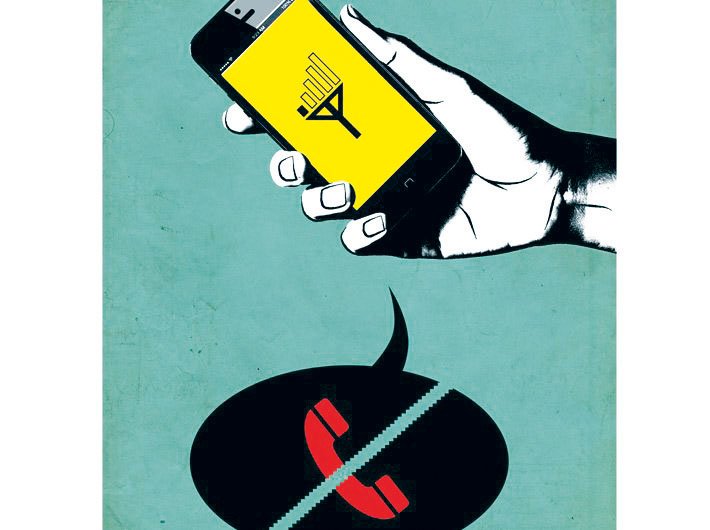Ask the customers who continue to face call drops, even after telcos pledged an investment of Rs 12,000 crore to set up 60,000 towers
Have you ever wondered why the call metre on your mobile screen doesn’t stop even after you have lost the voice of the other person during a call? You may pointlessly repeat ‘Hello? Are you listening?’ several times, but the metre continues to run until you disconnect. In the last two years the call drop – sudden disconnect of a call over a mobile network primarily due to poor tower connectivity managed by the telecom service providers – has become a routine affair. The issue pestered everyone so much that the NDA government, gearing up for assembly elections one after another, has time and again voiced its commitment to take up the issue with the telcos strong-handedly. Nothing has come out so far from all the rhetoric.
The Telecom Regulatory Authority of India (TRAI) has found out that telcos are employing higher values of radio link time-out (RLT), one of the parametres to ascertain how long a call should be sustained in case of poor signal. The TRAI came out with a report, in early June, on network related tests in Hyderabad where it found that the operators have set higher value of RLT (over 40) to mask call drops. The manipulation compels consumers to pay even for a failed call. The department of telecommunications (DoT), under the communications and IT minister Ravi Shankar Prasad, however has no answers. [It is interesting to note here that Prasad was called a call drop minister during the Bihar assembly elections.]
The government has chosen to go slow in dealing with the call drop issue and telcos. It is not in favour of the approach taken by TRAI which seeks to penalise telcos and force them to invest in infrastructure and optimise network stations. Telecom secretary JS Deepak met CEOs of major telecom service providers (TSPs) including Bharti Airtel, Vodafone India, Idea Cellular and Reliance Jio on June 10 and said that they have promised to invest Rs 12,000 crore to improve the quality of service. “The mobile phone operators have promised to add 60,000 new cell sites where they need to improve their quality of service,” Deepak told the press. “The government believes in the telecom sector. The quality of service must improve and the industry has responsibility,” he added. He however made it clear that the government is not in favor on taking stricter action against the TSPs.
After conducting surveys in various cities the TRAI found that most of the TSPs do not meet the call drop benchmark under quality of service norms. It has recommended imposing a fine of Rs 1 for every call drop, with a maximum cap of three call drops for penalisation. The TSPs challenged TRAI’s order in the supreme court, which quashed TRAI’s order. The regulator then wrote a letter to the DoT asking it for powers to impose a fine up to Rs 10 crore on TSPs and imprisonment of up to two years of their officials over call drop. The telcos termed TRAI’s demands as “draconian” and “arbitrary”.
The telecom secretary disagreed with TRAI’s views. “I am not sure penal power will be one and final solution to this. In my personal opinion, I do not agree that for every call drop a person has to be sent to jail,” Deepak said. Meanwhile, minister Prasad has reassured that the call drop issue would be over soon. While talking to the press on June 7, he said that the government would soon allocate spectrum worth over Rs 2,000 crore to telcos, eventually helping consumers get rid of call drops. But he didn’t say how soon. Only time would tell.
feedback@governancenow.com
(The article appears in the June 16-30, 2016 issue)
